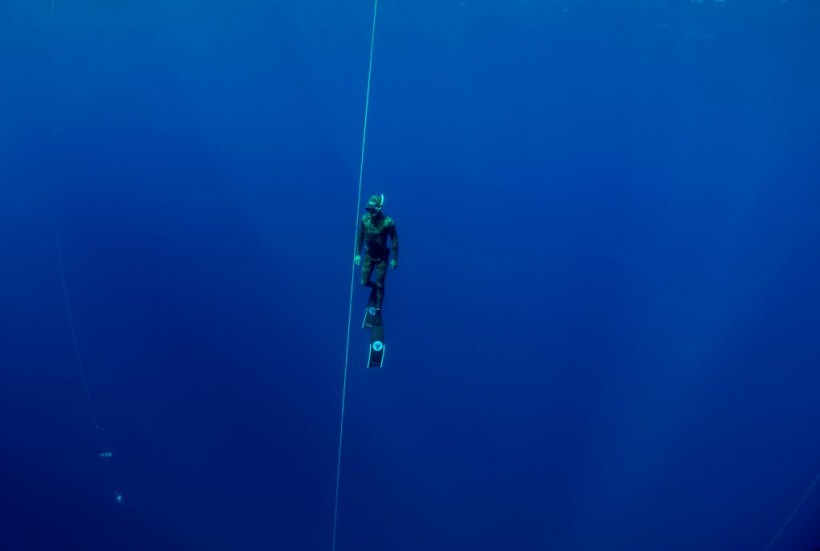A new study found that elite freedivers have outdone seals in some measures. They dive in open seas and have oxygen levels lower than seals during their deepest dives.
Elite freedivers who reached the depths of 107 meters are found to have brain oxygen levels that would typically induce unconsciousness and heart rates that are as low as seals, dolphins, and whales while in water.
The study will help scientists understand the physiology of marine mammals and help them find novel ways to treat patients with cardiac disorders and improve the safety of freedivers.

A man competes in the constant weight (CW) category during a freediving competition off the coast of Salamis in the self-proclaimed Turkish Republic of Northern Cyprus (TRNC) on October 1, 2017. / AFP PHOTO / Emily IRVING-SWIFT (Photo credit should read EMILY IRVING-SWIFT/AFP via Getty Images)
Freedivers Have Extreme Human Endurance
In the study, entitled "When the human brain goes diving: using near-infrared spectroscopy to measure cerebral and systemic cardiovascular responses to deep, breath-hold diving in elite freedivers" published in Philosophical Transactions of the Royal Society B, researchers from the University of St. Andrews presented a major advance in the understanding of the effects of diving to the brains and cardiovascular systems of freedivers, and how far they could push their bodies.
"The diver can reach a point where hypoxic (low oxygen) blackout occurs, and the diver then needs to be rescued. One of the main aims of the research is to warn the diver and safety personnel of an imminent blackout," project leader Professor Erika Schagatay of Mid Sweden University said in the university's news release.
The team of international researchers from the University of St Andrews, Mid Sweden University, Carnegie Mellon University, and the University of Tokyo created the system that could be worn by freedivers during their dives. The near-infrared spectroscopy (NIRS) can work like a smartwatch that measures the heart rate, blood volume, and oxygen levels in the brain when the device is in contact with the skin.
It could work even in depths of up to 351 feet (107 meters). Due to the extreme depths that elite freedivers could go, they developed exceptional human endurance. They can dive for more than four minutes and reaching depths of hundreds of feet on a single-breath-hold, pushing themselves to the limit that their body can hold.
Researchers said that the freedivers showed exceptional physiological responses during their dives. Upon measuring, their heart rates are as low as 11 beats per minute and have blood oxygenation levels that drop to 25%, which is beyond the point that could cause unconsciousness and equivalent to the lowest values measured at Mount Everest.
ALSO READ: Dolphins Control Their Heart Rates to Avoid Decompression Sickness
Understanding How the Body Reacts to Low Levels of Oxygen and Blood
Lead researcher Dr. Chris McKnight told IFL Science that freedivers had outdone seals because even most of the dives of these mammals last only less than two minutes and catch fish that do not deplete them too badly to recover many times at the surface.
McKnight said that seals mode of oxygen conservation happens before diving, which helps them dive for longer periods than even the most accomplished humans who outmatch them in oxygen deprivation stakes.
Nonetheless. he believes that their observations offer a unique way of understanding how the human body responds to low levels of oxygen in the blood and brain and severe cardiovascular suppression.
RELATED ARTICLE: Human Evolution Evidently Taking Place Among Southeast Asian Free Divers
Check out more news and information on Freediving on Science Times.














